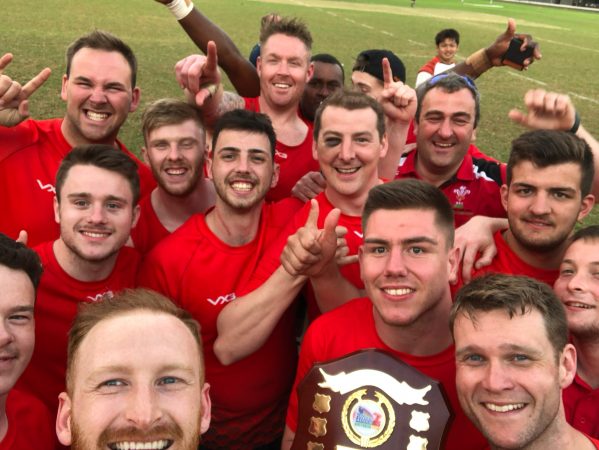Eight men's and four women's teams are competing in the Deaf Rugby World Cup in Argentina. Rugby World takes a look at this often-overlooked branch of rugby
Wales favourites at Deaf Rugby World Cup
Wales are going for a hat-trick of sorts in the World Deaf Rugby Sevens World Cup that has kicked off in Cordoba, Argentina.
It’s only the third Deaf Rugby World Cup and Wales won both previous editions, a four-team 15-a-side tournament in New Zealand in 2002 and the Sevens World Cup in Sydney five years ago, when England were defeated 21-15 in the final. The 2002 event, attended by Wales, Japan, New Zealand and Australia, also featured a sevens tournament that was won by Japan.
The logistics of organising a 15s tournament, which requires more players and more days to complete the schedule, means World Deaf Rugby is focusing on sevens as a way to embrace their ever-expanding family. The governing body has more than 20 members and many of them are in Argentina.
Men’s competition
Pool A
Wales, Japan, Barbarians, Fiji
Pool B
England, Australia, South Africa, Argentina
Women’s competition
Pool C
England, Australia, Wales, Barbarians
Wales and England are seeded, by virtue of reaching the final last time, and thus are in separate pools in the men’s competition. It was hoped that Kenya, Ghana and Papua New Guinea would participate too but visa and funding difficulties put paid to those plans.
The women’s event has doubled since 2018, when England and Australia played a five-match series. Wales and a multinational Barbarians team make it a four-team affair this time.
Wales men are the ones to beat and their linchpins include Shaun Miles, a stalwart of Premiership club Llandovery, and the joint captains, Ipswich-based Wes Pooley and Jon Cudd, brother of Dragons legend Nic.

Jon Cudd rises in a lineout. Players must average at least 40 decibels of hearing loss (Peter Meagher)
To be eligible, players must have an average of at least 40 decibels of hearing loss across both ears. Random hearing tests are conducted at the tournament.
Some players, like Cudd, are completely deaf in one ear but okay in the other. Many have had cochlear implants (hearing aids) since they were little. Wing Will Thomas, 22, was born deaf and relies on a sign language interpreter at training, and then hand signals from team-mates during matches.
The referees also use signals – for example, two hands in the air means ‘stop’. It’s a branch of rugby that most people never see.
“It’s probably a bit under the radar,” says Wales team manager James Savastano, who like the players has stumped up £1,400 for flights and kit to attend the World Cup. “Wales Deaf Rugby is a charity, even though it’s affiliated to the WRU. They give us Macron kit vouchers and stuff like that, but travel or tournament expenses are run out of the charity.
“Supposedly each country can only enter if they’re affiliated to their own national union, because that gives them the insurance. And that’s been a stumbling block. I know Argentina didn’t come to Australia because they weren’t affiliated to the Argentinian rugby federation. They are now, so those things are moving forward.”

A scrum from the 2018 men’s competition. The next tournament is set to be held in Wales (Peter Meagher)
Wales are confident of getting the necessary support to stage the next Deaf Rugby World Cup in either 2025 or 2026. The specific year hinges on whether Japan, who are hosting the next Deaf Olympics in Tokyo in 2025, can convince the ICSD (International Committee Sports for the Deaf) to add rugby to the Deaf Olympics portfolio. “If rugby is in the Olympics, why shouldn’t it be in the Deaf Olympics?” says Gwynne Griffiths from World Deaf Rugby.

The draw. Finals Day, in which every team competes, takes place on Sunday
Griffiths is establishing World Deaf Rugby as a CIO (charitable incorporated organisation) in order to tap into funding and ease the financial burden on participating nations.
“The difficulty has been that it hasn’t been 100% recognised by World Rugby. Because many of the countries aren’t affiliated to their union which is recognised by World Rugby. In Wales we’re affiliated, England are affiliated. But Australia, for example, aren’t members of the ARU, they’re just members of Australian Disabled Sport.
“So the difficulty has been that teams have to raise the funding themselves to go to these events, they’re not all funded by their bodies.”

Defending champions England score against Australia in the women’s event in Sydney (Peter Meagher)
Griffiths adds: “What we’re trying to do as an organisation is show that there’s another world event, and on this occasion Whisper TV, which covers rugby for S4C, have sent a crew to cover the event. They’re doing a documentary so they’ve been going to the training sessions, and have sent two cameramen and a producer to Argentina.”
Who does Savastano see as the main contenders in the men’s competition?
“I’d imagine it will be us, England, and, thinking of Sydney, Fiji were good. Typically Fijian, monsters who could run! Australia are quite good. South Africa didn’t have a full team so they merged with Portugal and Italy.”
South Africa are coached by ex-Springboks head coach Peter de Villiers and selected their squad after five coaching clinics across the country. Deaf Rugby is making a noise.
Download the digital edition of Rugby World straight to your tablet or subscribe to the print edition to get the magazine delivered to your door.
Follow Rugby World on Facebook, Instagram and Twitter.






